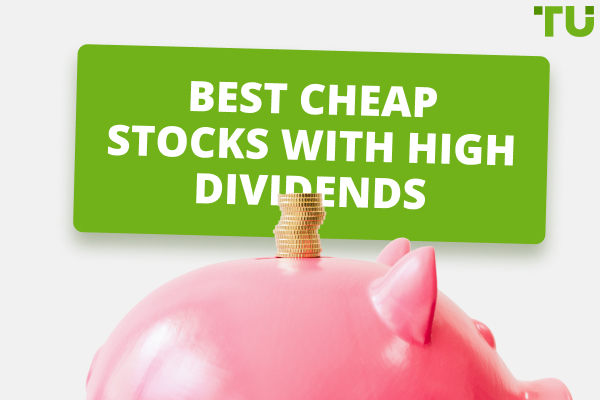How Do I Know What Stocks to Trade?
There is no such thing as the best stock. But you can consider the one that best fits your strategy, whatever it may be, based on fundamentals or technical analysis.
Stock trading is generally considered as one of the best passive wealth-building mechanisms of all time. It involves buying and selling publicly traded shares through specialized stock brokers for profit.
Selecting the best stocks to trade is an uphill task. This is partly because traders are faced with an avalanche of options which makes selecting the best stocks to trade difficult.
Beyond the theatrics of boring technicalities, this article exposes you to the nitty-gritty of selecting the best stocks to trade. It discusses the importance of using stock brokerage platforms with access to several stock exchange markets, and stock trading instruments to broaden your trading options. It also examines the technical and fundamental criteria for identifying good stocks, the use of stock scanners to find the best stocks, and essential factors to consider before choosing a stock.
As previously stated, the availability of a wide range of stocks across several stock broking platforms makes selecting the best a difficult adventure.
To be clear, there is no such thing as the best stocks to trade. The best stocks to trade for maximum profitability depend on your trading strategy and the ones that align with it. Whatever your trading strategy might be, it is best to base your stock buying decision on the strength of their fundamentals and technical analysis.
Start trading stocks now with RoboForex!How choosing the best stocks to trade depends on the broker
Stock trading comes in two market dimensions – the primary and secondary market dimensions. Companies' stocks become publicly available for the first time in the primary market through a process called “IPO” (Initial Public Offering).
Initial Public Offerings are only opened to institutional investors with more extra money to spare than the regular stock trader. Companies commission underwriting or investment banking firms to handle their IPOs and determine the price of their stocks to institutional investors.
Conversely, the secondary market is an all-comers affair. The basic requirement for stock trading at the secondary market level is access to stock markets including NASDAQ, and New York Stock Exchange (NYSE) through stock brokerage platforms.
Stock brokerage platforms serve as a conduit for everyday non-institutional investors or traders to access and trade the stock market for profit. The cyberspace is replete with several stock brokerage platforms, it is best to choose ones with access to several stock markets to maximize stock trading options.
Furthermore, choosing stock brokers with efficient stock analyzing tools that can also recommend the best-performing stocks is strongly recommended. Here are the best stock brokers for profitable trading.
Criteria to select the best stocks to trade
The volatile nature of the stock market means there will always be price movements. The ability to predict price movements for the best trading decision distinguishes successful stock traders from the rest. Using the two broad criteria of technical and fundamental analysis, selecting the best stocks to trade becomes less challenging.
Technical criteria for selecting the best stocks to trade
Technical criteria involve the use of technical analysis signals including candlesticks, chart patterns, indicator signals and volume spikes to ascertain price trends to predict stock price movements and profitability.
-
Candlesticks pattern: The use of candle sticks to predict price movement is a recurrent technical analysis decimal. It enjoys wide acceptance in the crypto, stock, foreign exchange (Forex) and derivative markets. Using the candlestick movement pattern and embedded information including opening and closing prices, highs and lows, traders can identify the best stocks to trade. Candlesticks come in different sizes and colors depending on the prevailing market conditions including trade intensity. A long candlestick signifies intense trading of the stock it represents and vice versa.
-
Chart patterns: in stock trading, chart patterns refer to a group of candlesticks and the patterns they form over a period. These patterns give broad insight into prevailing market conditions. Chart patterns come in different forms including the cup and handle, double top, rounding bottom, head and shoulders etc. Analyzing chart patterns can be quite herculean, using technical analysis tools and software is strongly recommended. Here are the best technical analysis tools and software for a profitable trading session.
-
Indicator signals: Stock broker platforms with indicator signals notify users of market trend, volatility, momentum, for the best trading decision. In recent times stock broking platforms have integrated AI functionalities into their systems to strengthen their indicator signals capacities.
-
Volume spikes: Just as its name suggests, volume spikes refer to a significant but sudden surge in trading activities signifying a renewed confidence in a stock. Volume spikes technical analysis enables traders to leverage a sudden price for profit.
Fundamental criteria for identifying a good stock to trade
While the technical analysis criteria for identifying good stocks to trade places heavy reliance on technical indices including the candlesticks, indicator signals, and volume spikes, the Fundamental criteria take things several steps further. It delves into the essential financial, economic and market factors affecting a company’s stock to determine viability and suitability for trade.
Fundamental criteria for identifying a good stock to trade take cognizance of the stock's real intrinsic value against placing reliance on superficial price trends. The fundamental criteria for identifying profitable stocks include industry, management team, corporate governance, prevailing economic conditions, income statement and balance sheet.
-
Industry: Companies and their stocks do not exist in a vacuum. As industry players, they are affected by industry-specific growth accelerating or limiting variables, including regulations and competition. For instance, a government regulation banning the sale of non electric vehicles (EVs) will positively affect the EV industry and their stocks. Keeping a tab on industry will shed light on the viability of their stocks.
-
Management team: A company's growth trajectory is determined by its management team. The fundamental criteria for identifying a good stock to trade stipulates picking stocks from companies with a competent management team with a track record of excellent performance. While an average stock trader may find it difficult to ascertain the competence of a corporation's management team, a simple web search of the management team may unravel their competence.
-
Corporate governance: Companies are duty-bound to deal fairly with their shareholders. Examining a corporation's corporate governance policy gives you a hint about its commitment to effective communication, transparency and fair play. Maximizing shareholders’ value is the prime duty of companies’ directors and their management team. They are required to adhere to the industry's best corporate governance standards to maintain shareholders' confidence and value.
-
Prevailing economic conditions: Fundamental criteria for selecting stocks recommend a surface-level analysis of a country’s prevailing economic conditions before trading the stock market. Stocks from a stagnant, receding economy may not yield the desired returns and vice versa. It is best to examine the economy's inflation rate, Gross Domestic Product (GDP) per capita, economic growth rate and similar factors before buying stocks.
-
Income statement: A company's income statement answers the basic question, is the company making a profit over a period? A profit-making company stock is much more likely to be profitable than a loss-making one.
-
Balance sheet: A balance sheet is much more comprehensive than an income statement. It contains other growth determining indices including liabilities, assets, and shareholder's equity holding. Liabilities refer to the company's debt obligations. The asset represents the company's inventory, banked cash, building and machinery.
Fundamental v technical criteria
Stock traders are often torn between using fundamental or technical criteria to determine the best stocks to buy, which begs the question of which is the best between the two criteria.
While TU recommends the combination of the two criteria, it is best to filter preferred stocks using the fundamental criteria before using the technical counterpart. Except with the aid of technical analysis tools inexperienced traders may find the technical analysis criteria very difficult to adopt.
How to use stock scanners
Selecting stocks that best suit your trading strategy can be challenging. It requires a thorough perusal of several stocks. Stock scanners automate stock selection by automatically scanning the stock market using your preferred profitability-determining metrics. Equipped with AI algorithms and sophisticated computing software, stock scanners not only save time, but they exponentially increase your chances of selecting the best stocks to trade. Check here for the best stock scanning services.
What you need to consider before choosing a stock to trade
Here are the necessary factors to consider before choosing a stock to trade: Commissions, leverage, short trade, market liquidity, volatility and share price.
-
Commissions: Stock brokers charge a commission for granting access to the stock market. Commissions vary from stocks to stocks and broker to broker. It makes perfect sense to consider the charged commission before choosing a stock to trade.
-
Short trading: This trading strategy involves selling stocks in anticipation of a price decrease. The aim is to repurchase upon the price decrease. This allows you to maximize price movement for profit.
-
Leverage: Leverage allows you to trade above your trading capital by “borrowing” from your stock broker to maximize profit. Brokers with leverage facilities can effectively remove or limit capital constraints to trading the stock market. As much as leverage allows you to maximize profit, it is a double-edged sword that can be disadvantageous if you trade at a loss.
-
Market Liquidity: Stock market liquidity rate is best described as the relative ease or otherwise of converting stocks to cash. You might want to consider easy-to-convert-to-cash stocks over the not-too-easy-to-convert-to-cash ones as it makes it easier to exit the market and recover your capital and profit.
-
Volatility: While the stock market is volatile, the degree of volatility more often than not depends on the stock. It is best to have a preference for less volatile stocks over the more volatile ones. It makes price predictability for profit easy.
-
Share price: Granted that some stock brokers allow you to buy fractional shares, why opt for fractional shares when you can buy a full stock? The more affordable stocks are, the bigger the quantity you can buy and the bigger the profit.
Final tips
Here are some useful final tips for successful stock trading.
-
If you are trading long term it is best to buy stocks from sectors that are acting stronger and performing better than the market on average.
-
Monitoring news and trends gives you deep insight into the market, allowing you to trade from a knowledgeable position which can minimize loss and maximize profit.
-
Stock trading comes with the risk of loss. It is best to analyze your trading position vis-à-vis risks and profit. Do not be carried away by the allure of profits.
-
Stay focused: While spreading your stock tentacles allows you to hedge against loss in some instances, it may be detrimental in the long run as you might lose focus and begin to chase shadows.
Best stock brokers 2024
Conclusion
Making a trading plan which includes outlining how to choose the best stocks based on trading preference, strategy, technical and fundamental criteria is essential for a profitable trading tenure. The trading plans should be analyzed adequately, scrutinized and reviewed if need be before approaching the market.
As previously stated, there is no one-size-fits-all trading strategy. To understand the trading strategy and style that best suits you, we recommend a thorough examination of your risk and volatility appetite, and stock price performance to choose the best trading and investment strategy.
FAQs
What is the best stock to trade for beginners?
The best stocks to trade for beginners are stocks from familiar household companies in their preferred trading niche or industry.
What are the top 10 stocks to buy now?
The best stocks to buy now include Bank of America, Amazon, Apple, Johnson and Johnson, McDonalds, Microsoft, Alphabet, Coca-Cola, Costco Wholesale Corp, and American Express.
What are technical analyses for selecting the best stocks to trade?
Technical analysis uses signals including candlesticks, volume spikes and indicator signals to predict stock price movement.
What is a stock scanner?
A stock scanner automates stock selection using set metrics.
Glossary for novice traders
-
1
Cryptocurrency
Cryptocurrency is a type of digital or virtual currency that relies on cryptography for security. Unlike traditional currencies issued by governments (fiat currencies), cryptocurrencies operate on decentralized networks, typically based on blockchain technology.
-
2
Investor
An investor is an individual, who invests money in an asset with the expectation that its value would appreciate in the future. The asset can be anything, including a bond, debenture, mutual fund, equity, gold, silver, exchange-traded funds (ETFs), and real-estate property.
-
3
Robo-Advisor
A Robo-Advisor is a digital platform using automated algorithms to provide investment advice and manage portfolios on behalf of clients, often with lower fees than traditional advisors.
-
4
Options trading
Options trading is a financial derivative strategy that involves the buying and selling of options contracts, which give traders the right (but not the obligation) to buy or sell an underlying asset at a specified price, known as the strike price, before or on a predetermined expiration date. There are two main types of options: call options, which allow the holder to buy the underlying asset, and put options, which allow the holder to sell the underlying asset.
-
5
Algorithmic trading
Algorithmic trading is an advanced method that relies on advanced coding and formulas based on a mathematical model. However, compared to traditional trading methods, the process differs by being automated.
Team that worked on the article
Glory is a professional writer for the Traders Union website with over 5 years of experience in creating content in the areas of NFT, Crypto, Metaverse, Blockchain, or Web3 in general. Over the last couple of years, Glory has also traded on different cryptocurrency and NFT platforms including Binance, Coinbase, Opensea, and others.
Dr. BJ Johnson is a PhD in English Language and an editor with over 15 years of experience. He earned his degree in English Language in the U.S and the UK. In 2020, Dr. Johnson joined the Traders Union team. Since then, he has created over 100 exclusive articles and edited over 300 articles of other authors.
Mirjan Hipolito is a journalist and news editor at Traders Union. She is an expert crypto writer with five years of experience in the financial markets. Her specialties are daily market news, price predictions, and Initial Coin Offerings (ICO).













